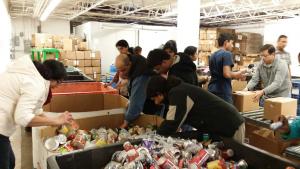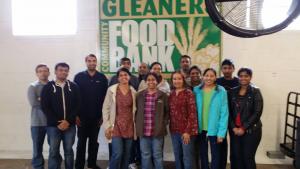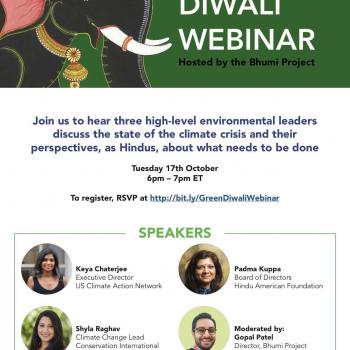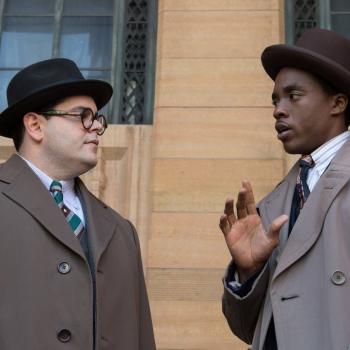At the recent Interfaith Leadership Council of Metropolitan Detroit’s annual gala, Kresge Foundation President Rip Rapson was awarded the 2017 Daniel Hart Krichbaum Visionary Civic Leader Award. In his acceptance speech, he spoke about The Imperative of Acting on Our Values, and forming alliances around the non-negotiable. Allowing a fellow human being to go hungry is something people of all faiths and no faith would agree is non-negotiable. We find many non-profit organizations in place to address the needs of those who are in need. From Gleaners Community Food Bank in southeastern MI to Akshaya Patra in Bengaluru, India, people are willing to donate and volunteer to support these organizations.
One of the most well-established initiatives is one that began at the Sri Shiva Vishnu Temple in Maryland, nearly a decade ago: Hindu American Community Services Inc (HACSI). As described on their website, Hindu Americans have “…always been generous in supporting worthwhile causes to help the needy, but until recently, bulk of their philanthropy was directed to educational and social welfare activities in India. However, there is a clear sign that members of the community are now increasingly taking interest in local community service activities such as feeding the homeless, assisting the elderly and mentoring children from inner [city] communities.” Several Hindu-American community organizations in the Washington area started in 2007 to collectively provide such services, and when Hindu refugees from Bhutan arrived starting in the country in 2008, the need became much more apparent.
HACSI has a flagship program, to prepare meals for the homeless in partnership with (and at) the DC Central Kitchen (DCCK), in Washington DC. With HACSI acting as the umbrella, the Hindu community, involving about twenty organizations, groups, temples, social and community associations works together to prepare 5,000 meals a day on 24 days in a year, Through HACSI, Hindu Americans provide more than 6.5% of the 1.86 million meals cooked in DCCK. About half the meals are served in the DCCK facility and the remaining are distributed through shelters housing the homeless, battered women, needy seniors and school children. HACSI and its affiliates have so far served more than

650,000 meals and donated more than $200,000 to DC Central Kitchen. On special occasions, for example in the first week of October, to commemorate the birthday of Mahatma Gandhi, HACSI volunteers also cook at other shelters in Montgomery County and Prince George’s County. HACSI attracts many from the generation(s) of Hindus born in America, such as HAF’s Director of Education and Curriculum Reform, Murali Balaji, a DC area resident. According to Murali, “HACSI has been an institution in the DC area for years. The work they do to uplift communities in need is an inspiration to future generations of Hindu Americans who seek to practice their faith through service (seva). It’s been such an honor and blessing to work with and learn from them.”

And in my own backyard, the Bharatiya Temple of Metropolitan Detroit, the SEVA (Society Enrichment through Volunteer Activities) Committee of the Temple performs a myriad of activities to help those in need through education, counseling, tutoring and of course – by providing food, educational supplies and material donations. Many of these efforts are targeted at helping the needy, both within and outside the Hindu community. This is partnered with education and outreach to the normative community, and attending interfaith gatherings like the IFLC dinner, so that Hindus sit alongside their Christian, Jewish, Muslim, Sikh, Baha’i and other neighbors. Narayanaswamy Sankagiri, Chair of the Bharatiya Temple’s Outreach Committee, heartily agreed with Rapson’s call to action. He pointed out how Rapson’s words echo what is happening: Hindus in America are acting on their values, on their dharma, to “strengthen the musculature of citizen-based problem-solving.” Part of one’s duty as a Hindu is to practice dharma, and share one’s artha with those less fortunate, to solve the problem of hunger.














